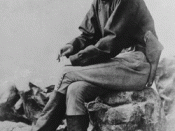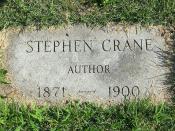A Simple Act of Heroism We all remember the childhood fairy tale about the knight who saves the princess from the evil dragon that locked her away in a tower. Our idea of a hero is often stereotyped to be this strong, courageous knight. However, if we believe this to be the definition of a hero what about all the other acts of heroism? If a poor simple man gives his last bit of food to the homeless family walking the streets , is he not a hero also? The simplest acts maybe considered heroic. In Stephen Crane's A Mystery of Heroism, the character displays a simple act of heroism. Fred Collins' heroism is defined by his intense situation , brave actions and the heroic outcome of the story.
The story is set during a battle of the Civil War. Stephen Crane is known mostly for writing American war novels ( "Stephen Crane" 233).
His character Fred Collins is a thirsty private during a battle on top of a hill. While gun fire lights the sky and men lie dying on the ground Fred can only think of his thirst and calls out "Thunder, I wisht I had a drink. Ain't there any water round here?"( Crane 487). Even with all the gunfire his mind does not turn from his thirst. He notices a well across the battlefield. To run across would be the same as committing suicide. Now he is torn between his thirst and his courage. Fred's comrades have now picked up on his dilemma and start to joke with him about fetching water from the well. Fred tries to stand up from himself and decides that he will go after the water. If Fred was to achieve his goal his comrades might think this a heroic act because of their dangerous situation. However, it might just be an act of stupidity. Fred now must decide if he is going to stand up for his pride and thirst or succumb to his fears.
Fred takes actions into his own hands. He goes in search of his captain. Collins then asks, " Captain, I want t' git permission to go git some water from that there well over younder"(489). His Captain warns him of the danger that this would cause. After contemplating for a moment he decided to let him go. If Fred has the desire to risk his life for a drink of water the Captain was going to take advantage of it. His Captain ordered him to take some of the other boys canteens with him and fill those up as well.
When Fred's comrades realized that he was really going to go, they were amazed. They did not believe that he would really risk his life when they were not dieing of thirst. However to Fred it was not about the thirst anymore it was about being brave and facing his fears. He did not want to look like a coward in front of all his comrades there for he was going to do it. He was going to walk straight into the face of death.
After successfully arriving at the well and filling a bucket full of water he started back. He noticed a wounded artillery officer on the ground. The officer notices Fred as he is running for his life spilling little bits of water here and there. The officer calls out to his with much trouble, " Say, young man, give me a drink of water, will you?" (492) Fred makes a quick decision and tells him he can not, for if he did it would probably cost him his life. Fred's emotions finally got the better of him and he quickly turned around. He held the dying officers head while he gave him probably his last sip of water. Fred quickly got back up and ran as fast as he could back to his regiment. Everyone was welcoming him home with smiles and laughter. Two lieutenants got their hands on if first and as they start to argue the bucket falls to the ground and lies empty.
Fred being at war and the situation he was in shows the risks that he takes by going after the water. The decision to go for the water and the outcome of the officer and when her returns to his regiment all contribute to helping answer the question of what makes a hero. Fred is a hero to the fallen officer and to the others that might have been thirsty but did not have the courage that Fred possessed. The irony at the end is typical of a Stephen Crane story (Crane). We never find out if Fred even has a sip of water himself. We shall never know if the officer drank all the water, Fred spilled it all running or the ignorance of the lieutenants is why the bucket is empty at the end. However, we did learn that many things can make up a hero. A hero could be the knight from the fairy tale or perhaps a simple Fred who gives away the treasure he risks his life for to a dying man.
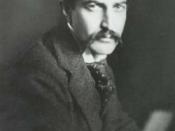
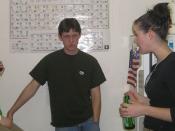
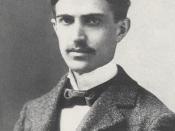
![English: w:Stephen Crane]].](https://s.writework.com/uploads/2/22855/english-w-stephen-crane-thumb.png)
